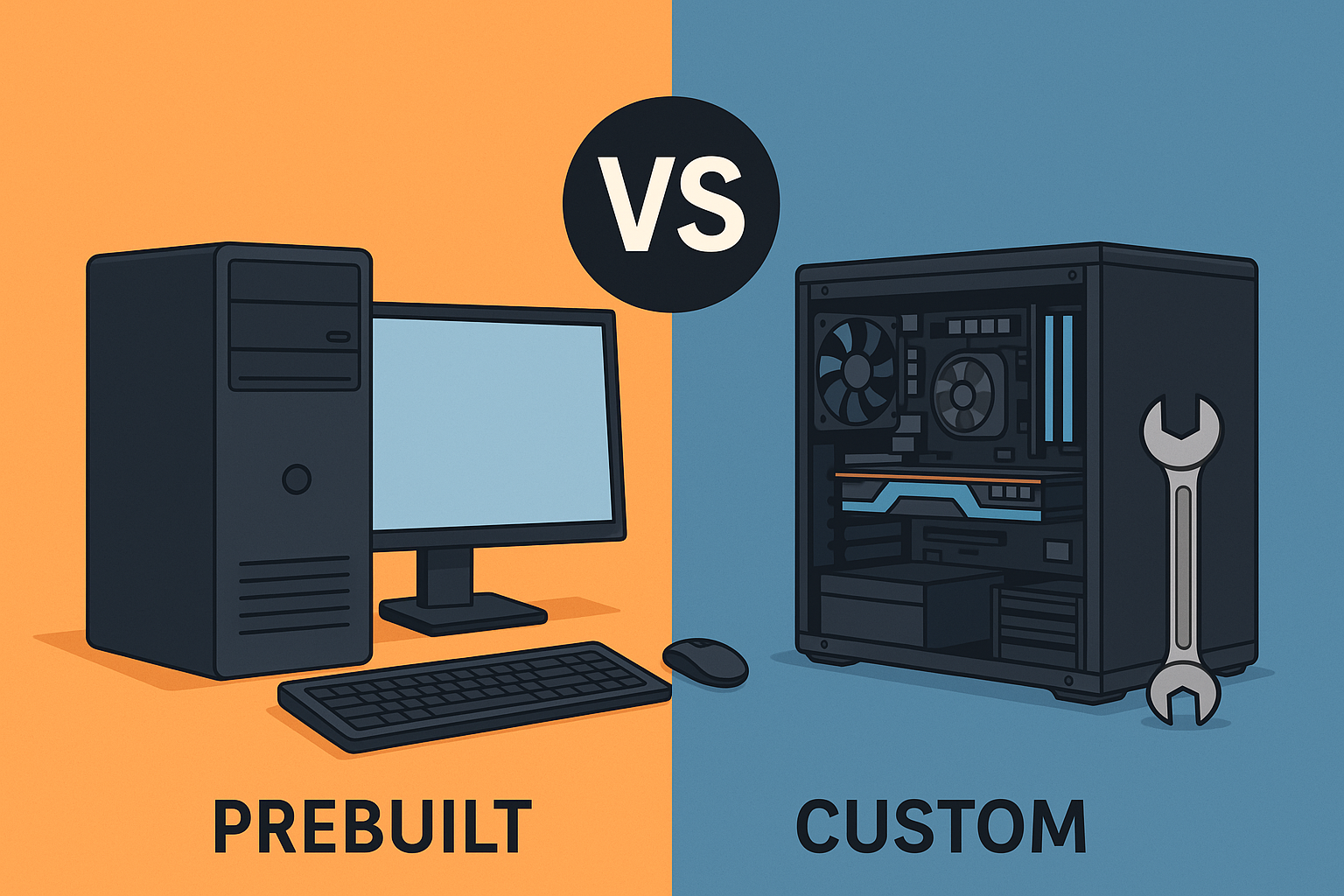Prebuilt vs Custom PCs: Which Is Better for You

With the rapid advancement in computer hardware, many users face a common dilemma: should you buy a ready-made prebuilt PC, or build a custom one from scratch?
Is building a PC always the better option? Or do prebuilt machines offer advantages that can’t be ignored?
In this guide, we’ll provide a detailed comparison between prebuilt and custom PCs in terms of performance, pricing, upgrade potential, support, and real-world use cases like gaming and professional work.
1. What’s the Difference Between a Prebuilt PC and a Custom Build?
Prebuilt PC
A complete system assembled by brands like Dell, HP, ASUS, Alienware, or MSI. Comes ready to use with Windows installed and usually includes customer support and warranty.
Custom PC Build
A PC you assemble yourself by selecting each component individually based on your needs, such as CPU, GPU, motherboard, RAM, and more.
2. Performance Comparison
Processor (CPU)
Prebuilt PCs may use good CPUs, but they are not always the latest models.
In a custom build, you can choose the newest processors for better performance and future-proofing.
Graphics Card (GPU)
Prebuilt systems might include decent GPUs, but often with limited cooling and upgrade options.
Custom PCs allow you to pick the exact GPU that matches your performance and budget requirements.
RAM & Storage
RAM upgrades can be limited in prebuilt machines.
Custom builds offer flexibility in RAM size, frequency, and choosing SSD/NVMe drives for faster performance.
3. Price-to-Performance Ratio
Custom PCs typically provide more value for your money.
Prebuilt PCs may include additional costs like Windows licensing, customer service, and proprietary case designs.
However, some prebuilt deals can be competitive, especially during sales.
4. Upgrade Flexibility
Custom PCs offer full upgrade freedom—you can replace any part anytime.
Prebuilt systems often come with proprietary cases or motherboards that limit upgrades or make them more complex.
5. Maintenance and Support
Prebuilt PCs come with full-system warranties and dedicated support.
Custom PCs require more self-maintenance, and each part has its own warranty.
However, they’re often easier to repair since you know exactly what’s inside.
6. Gaming Performance
Some prebuilt gaming PCs perform well out of the box, but may lack efficient cooling or upgradability.
Custom gaming PCs let you select high-end GPUs and advanced cooling solutions, making them ideal for 4K gaming and high refresh rates.
7. For Professional Use and Heavy Software
Prebuilt PCs might handle daily tasks and moderate editing work well.
Custom builds deliver better results in 3D design, AI, or video editing with tools like Adobe Premiere, AutoCAD, or Blender.
8. Pros and Cons of Each
Prebuilt PCs
Pros:
Ready to use immediately
Full warranty and support
Optimized case airflow and thermal design
Cons:
Limited upgrade potential
Higher cost for the same performance
Some use proprietary, non-replaceable parts
Custom PCs
Pros:
Hand-pick every component based on your needs
Better performance per dollar
Easily upgradable in the future
Cons:
Requires technical knowledge
No centralized customer support
Takes time to research and build
9. When to Choose Each?
Choose a prebuilt PC if you want a plug-and-play solution with support, and aren’t focused on upgrading.
Choose a custom PC if you want the best performance for your budget and plan to upgrade in the future.
Casual users and students might prefer prebuilt, while gamers, streamers, and creators usually go custom.
Conclusion
Both prebuilt and custom PCs have their place. If you value convenience and customer service, a prebuilt PC is a solid choice. But if you're chasing raw performance, customizability, and long-term value—go custom.
Whichever you choose, Doctor Computer is here to support your journey with expert guidance, original parts, and top-tier service.

